How to Tackle GRE
Step 1: Understand the problem
Step 2: Carry out a strategy for solving the problem
Step 3: Check your answer Here is a description of the three steps, followed by a list of useful strategies for solving mathematics problems.
Subjects ?
Important Links for GRE
| Sr No | Link |
|---|---|
| 1 | How to Write the Best SOP |
| 2 | How to Write the Best LOR |
| 3 | Shopping List for Studing Abroad |
Step 1: Read the statement of the problem carefully to make sure you understand the information given and the problem you are being asked to solve. It is important to understand what you need to accomplish in order to solve the problem. For example, what unknown quantities must be found? In what form must they be expressed?
Step 2: Carry Out a Strategy for Solving the Problem requires determining what mathematical facts to use and when and how to use those facts to develop a solution to the problem.
Step 3: Check Your Answer When you arrive at an answer, you should check that it is reasonable and computationally correct. Did you make a computational mistake in arriving at your answer? A key-entry error using the calculator? You can check for errors in each step in your solution.
Strategies are not fixed and you must follow the golden rule given in UPSCFEVER that is "Train, Compete, Repeat".
Prepare for the GRE in 2 months - Tips from the Topper's
You'll get two free practice tests from ETS itself (using the Powerprep software). Go through the untimed section once and also give one of the tests (timed). After this you'll have a basic idea of how your test will be. The GRE is a bit longer in duration than many other exams (about 4 hrs.).
You should be able to keep a cool head in these 4 hours. Apart from the ETS practice tests you can find 3 other standardized tests (free) i.e. Manhattan, Kaplan and Princeton GRE Practice Test. Or, you can always buy the test package from one of the reputed institutes.
But do use the three aforementioned tests! All you have to do is create a user ID at each of the websites (Kaplan, Manhattan and Princeton). If you buy the Official ETS GRE guide, you'll get two more tests (paper-based), so I strongly recommend you get it.
You will have 6 sections on the test.
First you will face the AWA (Analytical) Section. Out of the 5 sections left, only 4 of them will be used for calculating your score for the test. The other one is an experimental section.
They say that ETS has implemented this in order to gauge the general performance of the test takers and also to analyze the stats for their future test papers.
We will not know which section is the experimental one so please do not waste any sort of time trying to figure out which one is the experimental section. What we do know is that after the AWA section, you will have the Quantitative and Verbal sections in a random order.
The scores calculated will be taken from 2 Verbal sections and 2 Quantitative Sections. So it is imperative that you perform well in all the sections.
You will have an optional 10-minutes break after the first three sections. So now you've given a practice test and you can roughly identify the area you are weak at.
Let’s tackle the Verbal section first. (As this is a nightmare to most of us) The key to scoring a 160+ in this section is a really strong vocabulary.
The word lists are available at UPSCFEVER and you could practise with them.
'Word Power Made Easy (WPME)' and the 'Magoosh Vocab Wednesday Videos' (I strongly recommend you use the videos as much as possible. But they are only for those with a lot of time in their hands.
You need to have the ability to understand the question clearly. You need to keep your train of thought connected as you read through the question/passage and recognize what the question is asking for (this for all types RC, Sentence Completion). Also in the Reading Comprehension section, you might come across huge comprehensions with relatively tough questions. The only way to fire the gun properly now is by practice.
Practise is the key to success so solve as many tests as possible and find out where you went wrong and correct those. It is important to time yourself and remember as all questions have equal weightage so even if you cant solve one mark it for review and come back to it later.
Next the Quantitative section.
This is relatively the easier section and a score of 170 is pretty much possible.
ETS prepares the GRE examination that you will be appearing for, so there is no better material (for both verbal and quant) that will give you an idea of how the questions will be. UPSCFEVER content also covers ETS contents.
Once you've read the concepts go back to the mantra of practicing. Practice practice and practice. Remember the essence of these questions will be simple. But the question will not look so. It will be tricky and manipulative
Keep practicing meticulously. Don't give up if you aren't able to get the correct answers. For the multiple answers be sure to look at all the options. Few of the Data Interpretation questions will be straightforward and the others will be simple but lengthy.
Practice is the key for a high score in the Quant section too! (If you are an Asian student you will have less difficulty in understanding the quant concepts as most of the topics will be covered in high school math. But without practice, the questions can even trick the highly intelligent students)
Next, the AWA Section. This is actually the first section that you’ll face in the GRE. The GRE however gives you only 30 mins for each essay hence I wasn't at much ease. Also I did not practice for this section at all. (No wonder I didn't score well). You'll face two essays; the 'Issue Task' and the 'Argument Task'. The "Issue Task" presents an opinion on an issue of general interest followed by specific instructions on how to respond to that issue. You have to evaluate the issue, consider its complexities and develop an argument with reasons and examples to support your views. The "Argument Task" requires you to evaluate a given argument according to specific instructions. You will need to consider the logical soundness of the argument rather than agree or disagree with the position it presents.
I've read on various blogs that for the engineering programs the schools do not give much importance to the AWA score. But if you are looking to pursue a grad program in literature or journalism, you'll need a real good AWA score.
The score you get on the ETS Practice test is quite a good approximation of what you will get on the test day. So I’d recommend giving one of the paper-based tests from the Official ETS GRE material a few days before your GRE. Now I had a week's time, so I gave one test a day. I was able to gauge my performance after each test and scope out what I needed to work on. Do look into the explanations for the correct answers. Remember you should try and avoid making the same mistake twice. Keep track of your mistakes by writing them down and glance at them later before you give another test.
Finally, the Test Day !!!
Keep your cool throughout the examination. If you are stuck and unable to proceed, take a deep breath and relax. It helps! You have done loads of practice you will be able to crack that silly question but this time with a calmer state of mind. It is very easy to lose patience if you feel aren’t doing well, but keep it together for these 4 hours and you should be able to achieve a well-rounded score.
Don't give up if one of your sections didn't go well. You have the other sections to make up for it. If you've practiced enough you will never have to be in that position! Also please don't worry about which section is the experimental section. As far as you’re concerned, you have to do well in all the sections.
Do take the 10 mins break after 3 sections to come back with a refreshed mind. If you don't get a good score or at least what you aimed for, remember GRE is not the end! I could not get the score I aimed for and initially I was disappointed.
Soon I realized that it’s really of no use worrying about it. What you've got is what you've got. If needed, you can appear for the GRE again within 21 days, though I wouldn't recommend it (unless you got a really bad score and are willing to pay the fee for writing the examination again). I prepared exactly how I have described in the above paragraphs. I scored 328 and 331 in my last two mock tests.
Suggestion : Practice is the key thing for quant. Solve every problem even if you are sure about it. Don't convert fractions to decimals until the last step of the problem.
AWA:
Take it seriously and practice atleast one essay in every
two days and get it reviewed by somebody.
General Vocab advice:
-
Write down words that you find difficult. Maybe even make flashcards of your own. Attribute difficult words to settings you are familiar with - traits of your friends, characters from books and TV shows, etc. Use them in conversation , throw them into your writing and make mnemonics.
Is GRE the only criteria for selection ?
Usually the selection criterion goes like the list below in the decreasing order to importance:
- Academic GPA/CGPA/Percentage as well as ranking in your batch
- Undergrad university
- SOP
- Research ex/Work ex
- GRE
- LOR
These other factors will vary from case to case:
- Final Year Project
- Internship and papers
- Co/Extra-curricular
Problems people might face:
- Backlogs
- Year Gap
- Plagiarism
GRE Study material referred by Toppers
- Official GRE Super Power Pack - By ETS
- GRE Premier 2017 with 6 Practice Tests: Online + Book + Videos + Mobile (Kaplan Test Prep)
- Manhattan Prep GRE Set of 8 Strategy Guides
- Grockit 1600+ Practice Questions for the GRE: Book + Online (Grockit Test Prep)
- Barron's GRE 21/e 2016, PB.
- 5 lb. Book of GRE Practice Problems (Manhattan Prep GRE Strategy Guides)
- 1, 007 GRE Practice Questions (Graduate School Test Preparation)
- Official GRE Verbal Reasoning Practice Questions: 1 Book
- GRE Text Completion & Sentence Equivalence (Manhattan Prep GRE Strategy Guides)
- 500 Essential Words: GRE Vocabulary Flash Cards (Manhattan Prep GREStrategy Guides)
- GRE Reading Comprehension & Essays (Manhattan Prep GRE Strategy Guides)
Graduate Record Examination (GRE)
Graduate Resource Examination is a single exam that is conducted for admission to business as well as Graduate schools not only in the US but also in other countries all around the World.
The GRE General Test has a total weight of 340 marks and is the only test that allows you to have control over you skip questions and go back, change your answers and have control to tackle the questions you want to answer first.
The Test also allows you to retake the test again if you feel that you haven't done enough and you can send the revised scores to universities. However this option should be chosen with care and you shouldn't give the exam unless you are well prepared for it as the cost for Indians is $205.
Graduate Record Examination (GRE) Exam - Structure
The exam contents is to test the student's aptitude for the courses he wants to pursue for his higher education.
- Verbal Reasoning content Measures ability to understand and evaluate written material and develop information obtained from it.
- Quantitative Reasoning measures problem-solving ability using basic concepts of arithmetic, algebra, geometry and data analysis.
- Analytical Writing Measures critical thinking and analytical writing skills
Subjects ?
Who takes this Test ?
Graduates of various disciplines wishing to pursue Masters in business, technology or a Doctoral degree give this common entrance test.
Although just a GRE score cannot guarantee you admission to top universities.
Most of the business schools don't differentiate between GRE or GMAT.
Test Dates and Centers ?
If you would like to register for the test, you will need to create or sign in to your ETS Account.
Click the link here for that. ---> Sign in to ETS Account
The computer-delivered GRE is offered throughout the year Appointments are scheduled on a first-come, first-served basis.
When selecting a test date, make sure your scores will be reported in time for your application deadlines.Scores reports are sent to you approximately 10ֱ to 15 days after your test date.
You should also consider allowing time for delivery of scores and processing by the institution.
You can take the computer-delivered GRE General Test once every 21 days, up to five times within any 12-month period.
Check Availability of a test center near your home. GRE Test Centers and Dates
Official Reading Comprehension Guide.
Reading Comprehension questions check the following
- understanding the meaning of individual words and sentences
- understanding the meaning of paragraphs and larger bodies of text
- distinguishing between minor and major points
- summarizing a passage
- drawing conclusions from the information provided
- reasoning from incomplete data to infer missing information
- understanding the structure of a text in terms of how the parts relate to one another
- identifying the author's assumptions and perspective
- analyzing a text and reaching conclusions about it
- identifying strengths and weaknesses of a position
- developing and considering alternative explanations
Each Reading Comprehension question is based on a passage that may range in length from one paragraph to several paragraphs.The test contains approximately 10 passages of 1 to 3 paras long.
Typically each has one to six questions.
Questions ask you to select the right option or multiple right options some ask you to select a sentence from the passage.
Official Sample Questions for Reading Comprehension.
Questions 1 to 3 are based on this passage.
Reviving the practice of using elements of popular music in classical composition, an approach that had been in hibernation in the United States during the 1960s, composer Philip Glass (born 1937) embraced the ethos of popular music in his compositions. Glass based two symphonies on music by rock musicians David Bowie and Brian Eno, but the symphonies' sound is distinctively his. Popular elements do not appear out of place in Glass's classical music, which from its early days has shared certain harmonies and rhythms with rock music. Yet this use of popular elements has not made Glass a composer of popular music. His music is not a version of popular music packaged to attract classical listeners; it is high art for listeners steeped in rock rather than the classics.
Q. The passage addresses which of the following issues related to Glass's use of popular elements in his classical compositions?
- How it is regarded by listeners who prefer rock to the classics
- How it has affected the commercial success of Glass's music
- Whether it has contributed to a revival of interest among other composers in using popular elements in their compositions
- Whether it has had a detrimental effect on Glass's reputation as a composer of classical music
- Whether it has caused certain of Glass's works to be derivative in quality
Select the sentence that distinguishes two ways of integrating rock and classical music.
How to tackle Text Completion
Text Completion questions test this ability by omitting crucial words from short passages and user then has to fill the blanks
Question Structure
- Passage composed of one to five sentences
- One to three blanks
- Three answer choices per blank (five answer choices in the case of a single blank)
- The answer choices for different blanks function independently; i.e., selecting one answer choice for one blank does not affect what answer choices you can select for another blank
- Single correct answer, consisting of one choice for each blank; no credit for partially correct answers
Official Sample Questions - Text Completion
It is refreshing to read a book about our planet by an author who does not allow facts to be (i)__________ by politics: well aware of the political disputes about the effects of human activities on climate and biodiversity, this author does not permit them to (ii)__________ his comprehensive description of what we know about our biosphere. He emphasizes the enormous gaps in our knowledge, the sparseness of our observations, and the (iii)__________, calling attention to the many aspects of planetary evolution that must be better understood before we can accurately diagnose the condition of our planet.
Sample Question 1 Answers.
Blank (i) overshadowed , invalidated , illuminated
Blank (ii) enhance , obscure , underscore
Blank (iii)plausibility of our hypotheses, certainty of our entitlement, superficiality of our theories
The correct answer is Choice A (overshadowed), Choice E (obscure) and Choice I (superficiality of our theories).
Sentence Equivalence Strategy and Tips
Sentence Equivalence questions test the ability to reach a conclusion about how a passage should be completed on the basis of partial information, but to a greater extent they focus on the meaning of the completed whole.
Question Structure
Consists of:
- a single sentence
- one blank
- six answer choices
- Requires you to select two of the answer choices; no credit for partially correct answers.
Tips for Answering
- Do not simply look among the answer choices for two words that mean the same thing.
- Read the sentence to get an overall sense of it.
- Identify words or phrases that seem particularly significant.
- Try to fill in the blank with a word that seems appropriate to you and then see if two similar words are offered among the answer choices.
Official - Sentence Equivalence Sample Questions
Q. Although it does contain some pioneering ideas, one would hardly characterize the work as __________.
- orthodox
- eccentric
- original
- trifling
- conventional
- innovative
Explanation
The correct answer is Choice C (original) and Choice F (innovative).
How to tackle the Quantitative Reasoning Type
The Quantitative Reasoning measure of the GRE General Test assesses your:
- basic mathematical skills
- understanding of elementary mathematical concepts
- ability to reason quantitatively and to model and solve problems with quantitative methods
The content in these areas includes high school mathematics and statistics at a level that is generally no higher than a second course in algebra; it does not include trigonometry, calculus or other higher-level mathematics
Official Book with Practice questions
-----> MATH REVIEW
Math Conventions Book - Official Guide
Note: Online Calculator shall be provided for the Quant section.
Official Questions of Quantitative Reasoning Type
Types of Questions:
- Quantitative Comparison Questions
- Multiple-choice Questions — Select One Answer Choice
- Multiple-choice Questions — Select One or More Answer Choices
- Numeric Entry Questions
Q. Quantity A = x squared + 1 Quantity B = 2x minus 1
Options
- Quantity A is greater.
- Quantity B is greater.
- The two quantities are equal.
- The relationship cannot be determined from the information given.
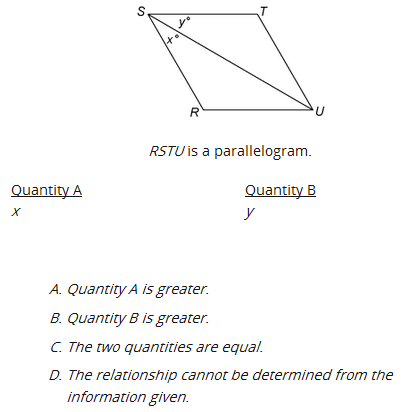
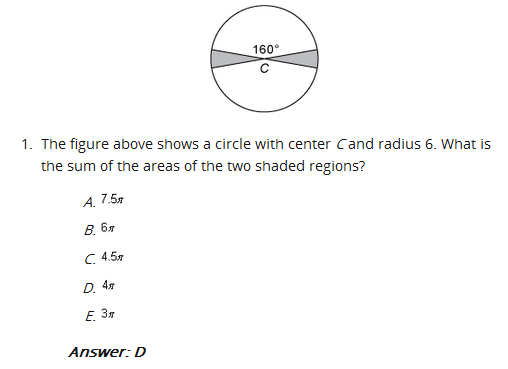
Each employee of a certain company is in either Department X or Department Y, and there are more than twice as many employees in Department X as in Department Y. The average (arithmetic mean) salary is $25,000 for the employees in Department X and $35,000 for the employees in Department Y. Which of the following amounts could be the average salary for all of the employees of the company?
Indicate all such amounts.
- $26,000
- $28,000
- $29,000
- $30,000
- $31,000
- $32,000
- $34,000
Answer: A and B
If f, g, and h are positive integers such that f is a factor of g, and g is a factor of h, which of the following statements must be true?
Indicate all such statements.
- f is a factor of g squared
- f is a factor of gh.
- f is a factor of h minus g
Answer: A, B and C
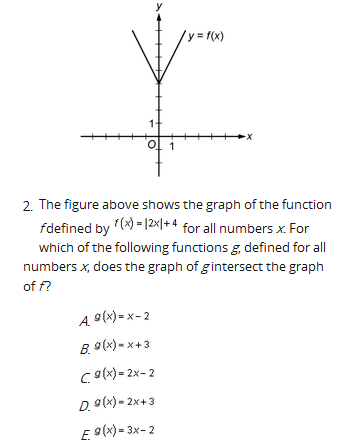
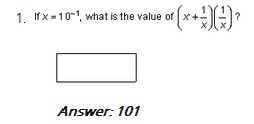
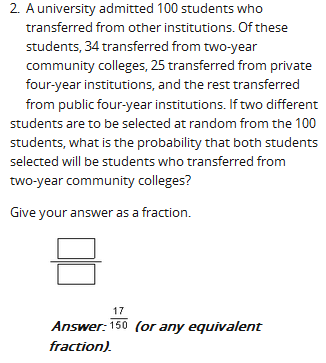
- $22,500
- $29,925
- $30,000
- $33,000
- $33,075
Answer: B
At Business M, the value of the inventory for May was what percent of the value of the inventory for June?
Give your answer to the nearest 0.1 percent. _______
Answer: 89.3%
For which of the six businesses shown was the percent change in the value of the inventory from April to June greatest?
- G
- K
- M
- R
- V
Answer: A
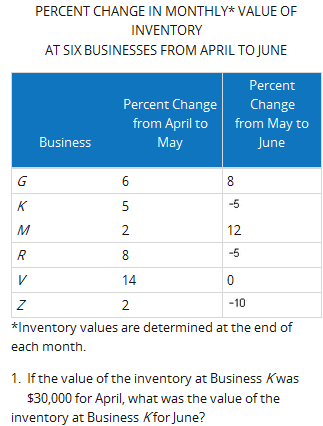
Approximately how many people are in the production and transportation sector of the workforce?
- 9 million
- 12 million
- 15 million
- 18 million
- 21 million
Answer: E
Introduction to Analytical Writing
The Analytical Writing section measures your ability to:
- articulate complex ideas clearly and effectively
- support ideas with relevant reasons and examples
- examine claims and accompanying evidence
- sustain a well-focused, coherent discussion
- control the elements of standard written English
The Analytical Writing measure consists of two separately timed analytical writing tasks:
- 30-minute "Analyze an Issue" task
- 30-minute "Analyze an Argument" task
The Issue task presents an opinion on an issue of general interest followed by specific instructions on how to respond to that issue.
The Argument task requires you to evaluate a given argument according to specific instructions.
Individuals taking the computer-delivered test will use a basic word processor
Preparing for the Analytical Writing Measure
Everyone — even the most practiced and confident of writers — should spend some time preparing for the Analytical Writing measure before arriving at the test center.
The tasks in the Analytical Writing measure relate to a broad range of subjects — from the fine arts and humanities to the social and physical sciences — but no task requires knowledge of specific content.
The task elicited the kinds of complex thinking that university faculty consider important for success in graduate school.
Test-taking Strategies for the Analytical Writing Measure
Before taking the GRE® General Test, review the strategies, sample topics, essay responses and reader commentary for each task contained in this section.
It is important to budget your time.
Save a few minutes at the end of each timed task to check for obvious errors.